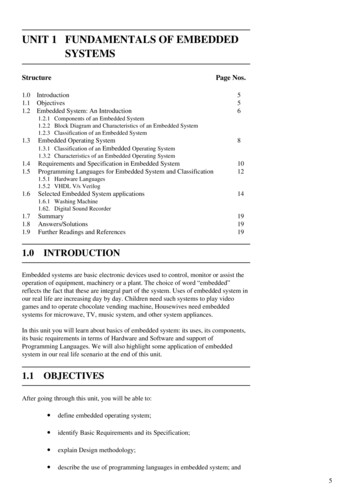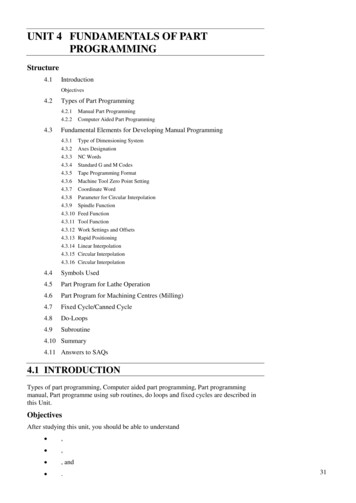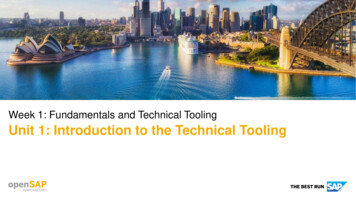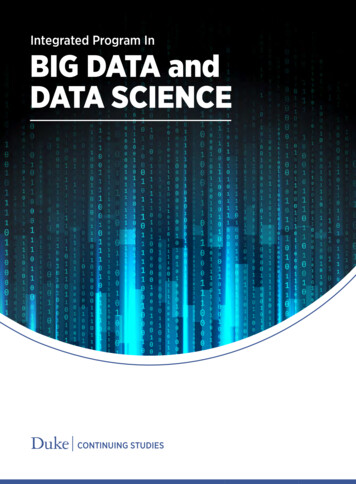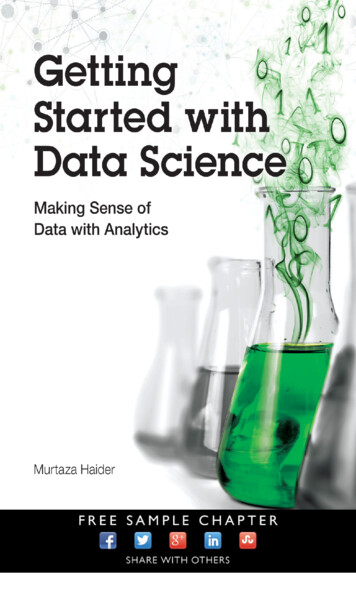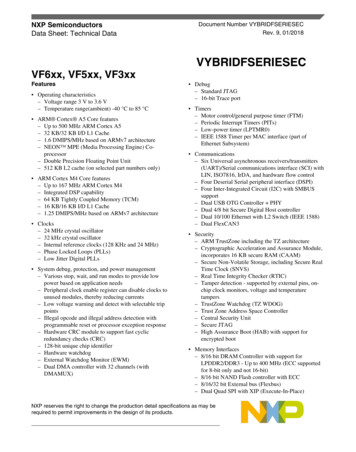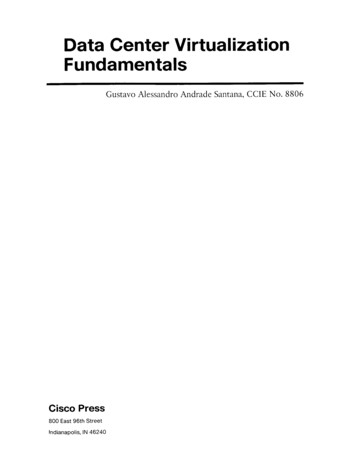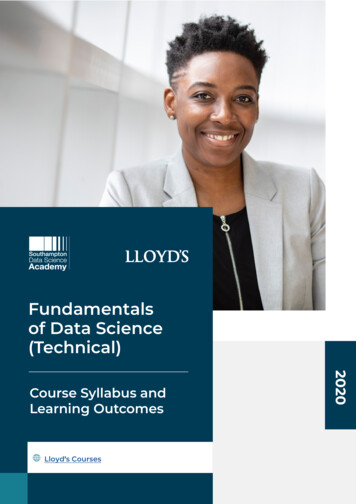
Transcription
Fundamentalsof Data Science(Technical)Lloyd's Courses2020Course Syllabus andLearning Outcomes
CONTENTSCOURSE OVERVIEW03COURSE STRUCTURE- Weeks 1 - 804AIMS AND LEARNING OUTCOMES- Hands-on Experience- Technology Stack used for Exercises and AssignmentsMODULESAND TOPICS-WeekWeekWeekWeekWeekWeek1:Welcome and Course Information2:Introduction to Core Concepts and Technologies3:Data Collection and Management4 & 5: Data Analysis6 & 7: Data Visualisation8:Future of Data Science0506 - 08
Course OverviewFundamentals of Data Science - TechnicalDuration: 8 weeksNumber of hours: 60 (includes tutorial support self-study, assignments and peer discussions)Assignments: Three assignments (each worth 33% of the final mark)This course equips you with the theoretical knowledge and both practical and technical skills toparticipate in the flourishing data revolution, helping you to contribute to and benefit from thenew data-driven economy. The course emphasises a hands-on approach to learning data skills,offering a number of interactive, online exercises that will let you try out many of the techniquesand concepts covered in the taught material.The course is broken into eight weeks.3FUNDAMENTALS OF DATA SCIENCE (TECHNICAL) - COURSE SYLLABUS AND LEARNING OUTCOMES
Course StructureWeek 1In week 1, you will meet your tutor and the other participants on this course and find out moreabout what you will be doing over the next eight weeks and how we will be supporting you. Youwill get "hands-on" experience of Jupyter, the web-based learning environment which you willuse for the course exercises and assignments. This week also contains a Python Primer activity forthose of you who are unfamiliar with the programming language or would like a refresher.Week 2In week 2, you will learn about the fundamental terminology and processes in data science,discovering the technology landscape that has helped fuel the data explosion, and the toolsthat data scientists use to unlock the hidden value in these vast amounts of data. This week alsocontains an introduction to using Python for data science.Week 3You will begin gaining hands-on experience of data science in week 3, focusing on collecting,storing and managing data, and you will learn about the different sources of data and how theycan be combined in order to increase the potential insights available.Week 4 & 5Weeks 4 and 5 will help you understand how this data is analysed, covering a range of techniquesthat any data science team will encounter, from statistics to machine learning. You will use Pythonto analyse some given data.Week 6 & 7In weeks 6 and 7, you will learn about how the findings from data science work can be reportedusing different data visualisation techniques. You will discover the various ways in which particulartypes of data can be displayed in order to highlight a key finding and improve the impact of yourreports.Week 8In week 8, you will look at the future of data science and we will support you to finish off yourassignments.4FUNDAMENTALS OF DATA SCIENCE (TECHNICAL) - COURSE SYLLABUS AND LEARNING OUTCOMES
Aims and Learning OutcomesThis module aims to provide you with the knowledge and expertise to become a proficient datascientist.Having successfully completed this module, you will be able to:} Understand the key concepts in data science, including their real-world applications and thetoolkit used by data scientists} Explain how data is collected, managed and stored for data science} Implement data collection and management scripts using NodeJS and MongoDB} Demonstrate an understanding of statistics and machine learning concepts that are vital fordata science} Produce Python code to statistically analyse a dataset} Critically evaluate data visualisations based on their design and use for communicating storiesfrom data} Plan and generate visualisations from data using Python and BokehHands-on ExperienceWeek 1 includes an (optional) introduction/'refresher' on Python. This includes online exercisesfor you to work through at your own pace. This not graded.Week 2 contains further Python practice exercises. You are encouraged to do these as these willhelp you with your assignments. Again, these practice exercises are not graded.Weeks 3, 4 and 5 each include online exercises (ungraded) and a related graded courseworkassignment.Technology Stack used for Exercises and AssignmentsVisualisingBokeh (Python)Stats / AnalysisNumPy / SciPyManagement / QueryingMongoDB (using Python)BasePython5FUNDAMENTALS OF DATA SCIENCE (TECHNICAL) - COURSE SYLLABUS AND LEARNING OUTCOMES
Modules and TopicsWeek 1: Welcome and Course Information} Welcome and introduction} Help and tutoring support} Learning outcomes of the week} Course assignment details} What data science is and why it isimportant} A 'hands-on' Jupyter familiarisationactivity} Course syllabus and learning outcomes} Python Primer} Using discussion forums} Glossary of terminology} Introduce yourselfWeek 2: Introduction to Core Concepts and Technologies} Introduction} A data science toolkit} Learning outcomes of the week} Types of data} Data science in a nutshell} Example applications} Terminology} Further reading} The data science process} Summary6FUNDAMENTALS OF DATA SCIENCE (TECHNICAL) - COURSE SYLLABUS AND LEARNING OUTCOMES
Week 3: Data Collection and Management} Introduction} Data storage and management} Learning outcomes of the week} Using multiple data sources} Sources of data} Further reading} Data collection and APIs} Summary} Exploring and fixing dataWeek 4 & 5: Data Analysis} Introduction} Basic machine learning algorithms} Learning outcomes of the week Linear regression} Terminology and concepts SVM} Introduction to statistics Naive Bayes Nature of statistics and introduction} Further reading Central tendencies and distributions} Summary Variance Distribution properties andarithmetic Samples/CLT7FUNDAMENTALS OF DATA SCIENCE (TECHNICAL) - COURSE SYLLABUS AND LEARNING OUTCOMES
Week 6 & 7: Data Visualisation} Introduction} Technologies for visualisation} Learning outcomes of the week} Types of data visualisation Bokeh (Python)} Further reading Exploratory} Summary Explanatory} Data for visualisation Data types Data encodings Retinal variables Mapping variables to encodings Visual encodingsWeek 8: Future of Data Science} Introduction} Learning outcomes for the week} The future of data scienceReady to start?Visit our website to secure your place now.If you have any questions about this course or the other courses available for Lloyd’s marketplaceprofessionals, call 44 (0)12 2344 7775 to speak to a member of our team.For data science news and insights follow Southampton Data Science Academy on:8FUNDAMENTALS OF DATA SCIENCE (TECHNICAL) - COURSE SYLLABUS AND LEARNING OUTCOMES
3 FUNDAMENTALS OF DATA SCIENCE TECHNICAL COURSE SYLLABUS AND LEARNING OUTCOMES Course Overview Duration: 8 weeks Number of hours: 60 (includes tutorial support self-study, assignments and peer discussions) Assignments: Three assignments (each worth 33% of the final mark) This course equips yo
